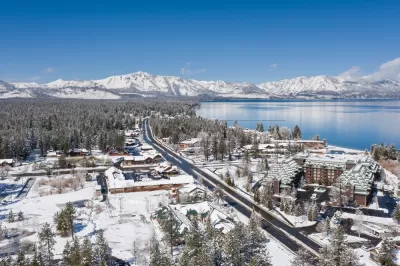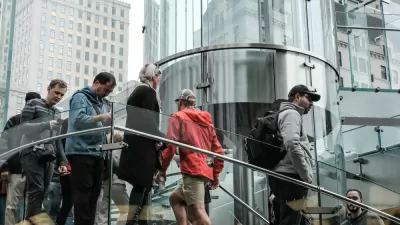After two years of remote work, many workers reluctant to return to the office are compromising with less frequent, longer ‘super commutes.’

“Super-commuters aren’t a new phenomenon. In sprawling countries like the US, for example, some workers, mainly senior executives, have been commuting long distances for years.” Now, reports Bryan Lufkin, the phenomenon is becoming more common with all types of workers who moved away from their office locations during the pandemic.
“The group of super-commuters has expanded as companies have allowed middle-class knowledge workers to come into the office two days a week, or one week a month,” says Bill Fulton, director of the Kinder Institute for Urban Research at Rice University. Lufkin asks, “Could this new form of commuting be the future, as workers embrace hybrid, and build lives further away from urban hubs?”
The article describes several workers in the U.S. and England who are adjusting to their new super-commuting lives. While there are logistical challenges and some tension with employers who have a hard time letting go of constant supervision, most workers seem keen on continuing to work mostly remotely.
FULL STORY: The workers taking on new 'super commutes'

Study: Maui’s Plan to Convert Vacation Rentals to Long-Term Housing Could Cause Nearly $1 Billion Economic Loss
The plan would reduce visitor accommodation by 25,% resulting in 1,900 jobs lost.

North Texas Transit Leaders Tout Benefits of TOD for Growing Region
At a summit focused on transit-oriented development, policymakers discussed how North Texas’ expanded light rail system can serve as a tool for economic growth.

Using Old Oil and Gas Wells for Green Energy Storage
Penn State researchers have found that repurposing abandoned oil and gas wells for geothermal-assisted compressed-air energy storage can boost efficiency, reduce environmental risks, and support clean energy and job transitions.

Private Donations Propel Early Restoration of Palisades Playground
Los Angeles has secured over $1.3 million in private funding to restore the Pacific Palisades playground months ahead of schedule, creating a modern, accessible space that supports community healing after recent wildfires.

From Blight to Benefit: Early Results From California’s Equitable Cleanup Program
The Equitable Community Revitalization Grant (ECRG) program is reshaping brownfield redevelopment by prioritizing projects in low-income and environmental justice communities, emphasizing equity, transparency, and community benefits.

Planting Relief: Tackling Las Vegas Heat One Tree at a Time
Nevada Plants, a Las Vegas-based nonprofit, is combating the city’s extreme urban heat by giving away trees to residents in underserved neighborhoods, promoting shade, sustainability, and community health.
Urban Design for Planners 1: Software Tools
This six-course series explores essential urban design concepts using open source software and equips planners with the tools they need to participate fully in the urban design process.
Planning for Universal Design
Learn the tools for implementing Universal Design in planning regulations.
Ascent Environmental
Borough of Carlisle
Institute for Housing and Urban Development Studies (IHS)
City of Grandview
Harvard GSD Executive Education
Toledo-Lucas County Plan Commissions
Salt Lake City
NYU Wagner Graduate School of Public Service




























